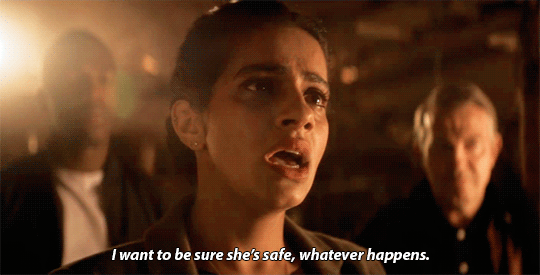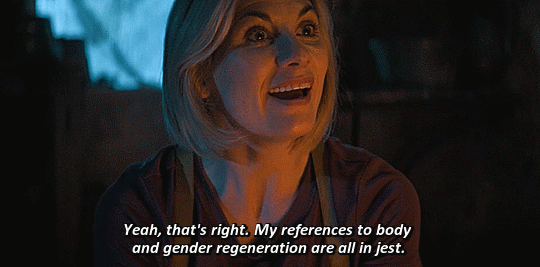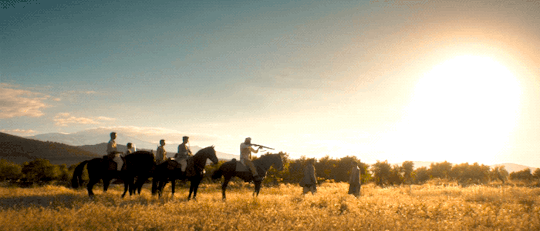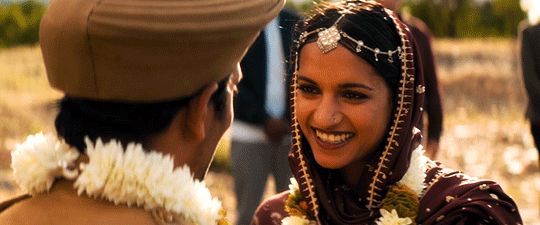The second half of series 11 begins as Doctor Who continues to tackle politically charged issues. This time it’s the region of Punjab, 1947, just as the Partition of India is going on. Yaz’s family history is on the line in “Demons of the Punjab” as the team tries to figure out what alien “demons” might be doing at this very delicate point in time.
You’re treading on your own history
“Demons of the Punjab” is Yaz’s episode. At least, as much as a full Team TARDIS allows any individual companion to have an episode dedicated to them. There are obvious parallels to the Eccleston episode “Father’s Day” in the premise: the Doctor’s companion asks them to see a family member. The Doctor should really know better at this point but Thirteen allows Yaz the same dangerous luxury they allowed Rose. The ways the events unfold are quite different in the two episodes, though.
Yaz only wanted to see her grandmother, Umbreen when she was younger, she didn’t want to change a thing. Unlike in “Father’s Day,” the timeline stays the same after the team leaves. The tragedy here is that they didn’t even know there was a life to be lost, but once they find out that Prem is destined to die, the Doctor and her friends can’t do anything about it. Change Umbreen’s first husband’s death and not only will the timeline change but Yaz will never be born, thus causing a paradox and creating Moffat-level complications for the Doctor. They have no choice but let history take its course.
That is the core of the “Demons of the Punjab,” even if the Doctor or Yaz don’t spend much time dwelling on it. It’s a fresh perspective on the trope that every time travel story plays with at least once: the personal timeline and the dilemma of whether to change it. Paul Cornell’s “Father’s Day” had Rose change her father’s fateful death, even if only in a small way, but here Yaz can only be a witness. That’s what the episode is saying though: Prem’s death, though inevitable, is witnessed.

We can’t have a universe with no Yaz
The personal story and the familial focus of the “Demons of the Punjab” is one of its greatest strengths, though I would have appreciated more of a focus on Yasmin herself. Her two conversations with Umbreen in 2018 that serve as bookends to the episode fell flat, partly because of the scenes Yaz has with her in 1947. There is the hint of a connection, and Yaz’s adoration for her nani is clear, but that’s mostly Mandip Gill carrying the scenes. Once the Thijarians show up, Yaz and her side of the story gets sidelined and that’s a shame. There are also nitpicks to consider, like Yaz not at all worrying that her grandmother might remember her or not particularly caring about meeting her great-grandmother as well. Yasmin probably never met Hasna and she’s just going to basically ignore her? Cold, PC Khan, stone cold.
The rest of the team takes a backseat this week, but they’re not without their own contributions to the story. Ryan has the least amount to do with his role being restricted to running after the Doctor and continuing to touch alien objects, but perhaps that’s for the best. The guy deserves a break after all. Graham gets to be everybody’s grandpa, most notably when he prepares Prem for his wedding, and finally has a one-on-one scene with Yaz. I’ve been expecting these two to start building their relationship and this episode gave them the perfect opportunity for some Team TARDIS bonding. Graham was the ideal person to provide Yaz with some well-needed perspective on her nan’s life and how she decided to tell it.
As for the Doctor, she sure does find it hard to say no to Yaz and is only slightly annoyed when she realizes the potential consequences of the trip. Okay, so Yaz didn’t actively and dramatically alter the timeline like Rose did, but Thirteen is “nice” and easy-going almost to a fault so far. It would be interesting to see a conflict arise between her and her companions. How would she deal with that? I do love their scenes and that they are already so close to each other, but a disagreement would truly test that. Until then, Yaz is there to remind the Doctor not to confuse the people of 1947 with their regeneration.

The Thijarians and what history means for Doctor Who
“Demons of the Punjab” borders on being a purely historical episode by not having its sci-fi element interfere with the main plot. The Thijarians are aliens, yes, but they are only a red herring as the villains and turn out to be benevolent beings. They’re not the ones causing death but the ones who honor the fallen. Their involvement only affects Prem—apart from Team TARDIS that is—and even his fate is not altered by their presence. In this way, “Demons of the Punjab” becomes the reverse of previous historical “Rosa”, where the goal was to stop a time traveller from changing history.
The significance of this is that series 11 doesn’t shy away from the past and its relevance for the present. With “Rosa,” plus “The Witchfinders” coming up in two weeks, that’s three confirmed historical episodes out of ten. Less than a third of this season is set in the past, and yet there’s demand for more sci-fi. But Doctor Who has always been about the past and history as much as it’s about space and aliens, ever since the now lost “Marco Polo.” But why is it important that Chibnall is more willing to let the Doctor travel to the past as well as the future?
Well, the significance of it all comes from what these episodes are conveying. “Rosa” was an amazingly poignant episode about racism and social progress. “Demons of the Punjab” not only shows the consequences British imperialism and meddling had but also shows the ugliness of war and intolerance. In its portrayal of the Partition of India and the effects that event had on one family in particular, “Demons of the Punjab” is effective in both informing the viewers and urging them to learn from the past. And what better day to air such an episode than on Remembrance Sunday and the 100th anniversary of Armistice Day?
But back to the Thajarians for a second and their lack of villainy. Their inaction leaves the story with its true antagonist as Prem’s brother Manish. But just like with the rest of the series so far, Manish is not a true villain. He’s confused and angry and his growing frustrations lead him to do something terrible, several terrible things in fact. The episode doesn’t spend nearly enough time developing him, unfortunately, but we still get the feeling that he’s only the enemy of this story because of his situation. If anything, Manish further proves the point that the episode (and Doctor Who as a whole, really) is trying to get across: love is more important than hatred.

Closing thoughts
“Demons of the Punjab” is yet another solid episode from this season, falling just between “Rosa” and “Arachnids in the UK” on my personal list so far. I have to say though, the execution leaves a little to be desired. Writing about the episode made me realize that it sounds a lot better as an idea than it was an actual episode of television. It’s still a good episode, but it wasn’t quite as excellent as it could have been.
The dialogue was awkward at times and coupled with weak delivery. I was tempted to mention it last week but now I really have to: some of the guest stars’ acting is mediocre at best. There’s also an ever-growing feeling that these episodes could use even more time than their 50-minute run in order for the characters to be properly developed. More focus on Yaz and Umbreen’s relationship with her would have been appreciated, as well as Manish getting more screen-time.
With all this being said, the cinematography is still stunning and the crew sure did make good use of their filming location in Spain. Segun Akinola also deserves a shout-out for the music this episode, especially the new version of the theme that played at the very end. And, of course, no review can go without mentioning how brilliant Jodie Whittaker continues to be along with her co-stars.
Overall, then, “Demons of the Punjab” is not without the flaws that much of the season is suffering from, but that doesn’t take away from its emotional impact and beautiful story. This is how historical episodes should be done: with informative value and relevance to the present.

Next week it’s back to space in “Kerblam!” with guest stars Julie Hesmondhalgh and Lee Mack.

